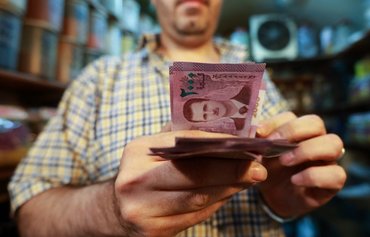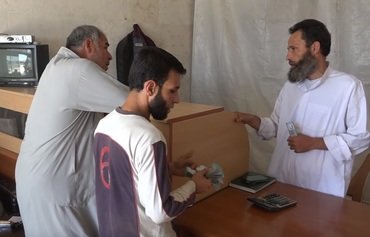The Syrian regime is directly responsible for the collapse of the pound against foreign currencies and an ensuing surge in the price of consumer goods, a Syrian economist said.
The price of food has skyrocketed amid the pound's devaluation, leaving many families hungry, economist Mahmoud Mustafa told Diyaruna.
The collapse of the exchange rate was a direct result of the regime's "faulty political and economic policies", he said, noting that "it did not take any measures to avert the catastrophe".
"The price for its negligence is being paid by the Syrian people, who must contend with prices that have risen to record levels and have placed many basic items beyond their reach," Mustafa said.
![Some economists blame the Central Bank of Syria for its role in triggering the currency crisis. [Photo courtesy of the Syrian News Agency]](/cnmi_di/images/2020/02/07/22315-Central-Bank-Syria-600_384.jpg)
Some economists blame the Central Bank of Syria for its role in triggering the currency crisis. [Photo courtesy of the Syrian News Agency]
There are many reasons for the economic crisis, he said, including the fact that the war drained the Syrian treasury, and that most production sectors are controlled by relatives of President Bashar al-Assad and people close to him.
The regime's biggest mistake was printing a large amount of Syrian currency and releasing it into the markets, he said, which led to higher inflation and the collapse of the pound, since most production sectors have stalled.
Ineffective regime measures
The crisis was caused by Syria's Central Bank, which set the price of the US dollar at 435 Syrian pounds, while at the same time announcing a preferential price of 700 pounds, Mustafa said.
This was seen as an admission of the pound's collapse, and prompted Syrians to turn to the black market, he said.
Most people are avoiding transferring money through official channels, as the dollar has neared the 1,200 pound threshold on the black market, he said.
Mustafa said the Syrian regime's measures to address the currency crisis will not reduce the exchange rate or ease the rise in prices.
A recent presidential decree increased the penalty for conducting transactions in foreign currencies, and the government shut down 14 currency exchange companies for four months on the charge of not supporting the pound, he said.
Additionally, he said, new legislation was issued to impose fines and prison sentences on anyone who promotes black market prices.
Mustafa noted that regime's policy is the main cause of the collapse of the pound and surge in prices, as it was the main reason for the imposition of sanctions.
Subsidies are insufficient
As the value of the pound plummeted, the Syrian regime in February began rationing subsidised food like rice and sugar with smart cards, AFP reported.
Thousands of Syrian families were issued cards to track and cap their purchases of subsidised food, the ministry of internal trade and consumer protection said.
Under the new system, even the largest family cannot collect more than three kilogrammes of rice, four kilogrammes of sugar and one kilogramme of tea a month. Smaller families are allowed even less according to their size.
Subsidies are key for Syrians living in regime-held areas.
But Ibrahim Saad, 51, asked how he was expected to feed his family with the latest rationing.
"The rice is not enough for a family of five or six people," said the father of three, who earns a meagre salary working in a grocery store. "Before the war, we could buy anything."
But now he and his wife have to keep track each month of the subsidised food and fuel they are allowed to buy in order to make them last.
Last year, the regime imposed limits on subsidised gasoline for cars and motorbikes, fuel oil and cooking gas, paralysing many sectors of the economy and triggering a fuel crisis.

![Syrians stroll through a food market. Shoppers are now facing higher prices as a result of the devaluation of the Syrian pound. [Photo courtesy of the Syrian News Agency]](/cnmi_di/images/2020/02/07/22314-Syria-food-market-600_384.jpg)






